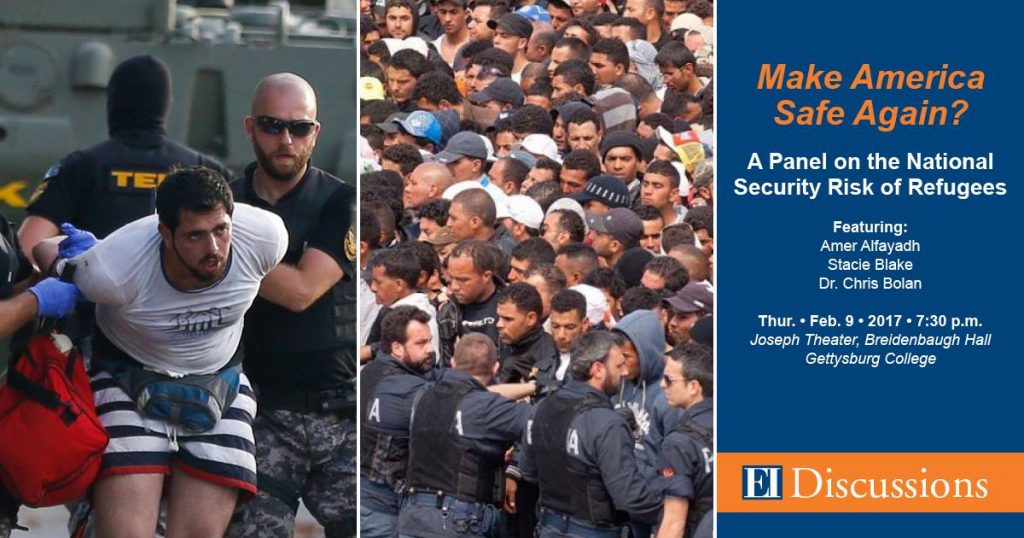EI Undergraduate Fellows Panel Probes Issues of Refugees, Terrorism, and National Security

The Eisenhower Institute’s promotional poster for the event, used courtesy of the Eisenhower Institute
By Benjamin Pontz ’20, Staff Writer
Amid the ongoing controversy surrounding President Trump’s recent executive order temporarily halting the refugee program and limiting the the number of refugees permitted to enter the United States each year to 50,000, the Eisenhower Institute’s first panel of 2017 was all the more timely as the Undergraduate Fellows hosted a panel discussion in a packed Joseph Theater that featured three speakers, whose expertise ranged from personally experiencing the vetting process for refugees, helping to settle incoming refugees, and studying national security policy with an emphasis on the Middle East.
The speakers were:
Amer Alfayadh, a case manager for the Church World Service in Lancaster, Pennsylvania, which BBC recently named “America’s refugee capital.” Though traditionally a conservative area politically, Alfayadh discussed the warm embrace refugees he works with receive in Lancaster as well as the experiences he has shepherding incoming refugees through the resettlement process.
Stacie Blake, the director of government and community relations for the U.S. Committee for Refugees and Immigrants, a non-profit organization that protects the rights and addresses the needs of persons in forced or voluntary migration. She voiced her concerns regarding the administration’s approach to immigration and refugee policy as well as statistical and anecdotal information emphasizing the need, in her view, for a change in perspective on such issues. At one point, she shared that, already, the administration’s rhetoric and actions on refugees have hindered cultural exchanges with prominent judicial leaders from Muslim countries. Accordingly, she urged attendees to judge others based on personal interactions rather than preconceived stereotypes.
Dr. Chris Bolan, a professor of Middle East Security Studies at the Strategic Studies Institute of the U.S. Army War College in Carlisle. He provided commentary on the refugee situation from a national security perspective. He argued that the terrorist threat to Americans is statistically negligible as U.S. citizens are far more likely to be struck by lightning than to be killed in a terrorist attack. Moreover, he said there is little substantive basis for the exaggerated fear some have of the threat posed by refugees. In particular, he noted that not a single refugee admitted to the U.S. has been responsible for a major terrorist attack. Moreover, he observed that more Americans have been killed by radical right wing groups than by radical jihadi extremists. Finally, as the San Bernardino attacks demonstrated, the larger terrorist threat is posed by existing U.S. citizens becoming self-radicalized via the internet as opposed to the unlikely prospect that a terrorist would immigrate through the already rigorous refugee admittance process.
The discussion was moderated by four of the EI Undergraduate Fellows: seniors Anthony Citarella, Yanet Gonzalez, Piper O’Keefe, and Alyssa Waaramaa.
Students from various political science classes as well as from across the campus attended the event, and extra seats were moved into the sides of the packed Joseph Theater, indicative of a strong student interest in the program.
Brendan Salyards ’20, a political science major, reflected on the panel by concurring with the panelists.
“I’d say my main take away was that experts agree that refugees do not pose a threat to the security of the United States and that there doesn’t seem to be a rationale, based upon national security interests, for barring them from entering the country.”
Note: Although the panel was held off-the-record, The Gettysburgian contacted the panelists afterwards for their permission to summarize the substantive portions of their comments that would otherwise not be publicly available.
